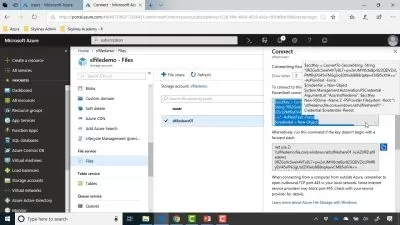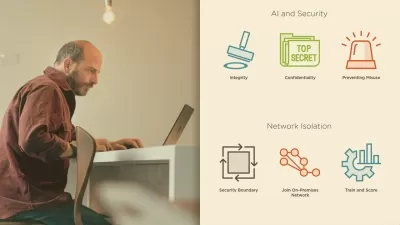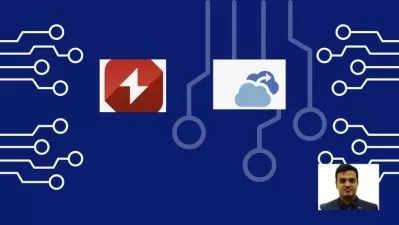Chaos Engineering using Azure Chaos Studio
Scott Duffy • 800.000+ Students
1:13:50
Description
Improve resilience and reliability of apps on Azure using Azure Chaos Studio and the principles of chaos engineering
What You'll Learn?
- Learn Chaos Engineering Basics: Understand the principles and benefits.
- Master Azure Chaos Studio: Set up and run chaos experiments.
- Build Resilient Azure Apps: Design robust applications ready for faults.
- Automate Chaos Tests: Use Azure DevOps and GitHub for continuous testing.
Who is this for?
What You Need to Know?
More details
DescriptionDive deep into the dynamic world of resilience with 'Chaos Engineering using Azure Chaos Studio.' This comprehensive course is meticulously designed for IT professionals and enthusiasts who are committed to enhancing the robustness of their applications deployed on Microsoft Azure. By integrating controlled chaos experiments, you'll learn how to proactively anticipate, identify, and mitigate potential disruptions before they impact your operations.
Throughout this engaging course, you will familiarize yourself with the core principles of chaos engineering. Begin with a solid introduction to the concepts and practices that underpin chaos engineering, including the importance of controlled disruptions to better understand system vulnerabilities. This foundational knowledge sets the stage for more advanced topics.
As you progress, you will delve into the functionalities and features of Azure Chaos Studio. You'll learn how to set up detailed chaos experiments, monitor their effects in real-time, and analyze the results to gain actionable insights. The course includes hands-on tutorials that guide you through configuring your first experiments, utilizing Azure’s built-in tools to simulate a variety of failure scenarios—from network latency issues to complete outages of critical services.
Additionally, the course will cover how to integrate chaos engineering practices into your existing DevOps workflows. You’ll explore how to automate chaos experiments using Azure DevOps and GitHub Actions, ensuring that resilience testing becomes a seamless part of your software development cycle.
This course is ideal for software developers, DevOps engineers, cloud architects, and site reliability engineers who are actively involved or interested in the deployment and management of cloud applications. It’s also highly beneficial for team leads and IT managers who oversee teams handling cloud services, providing them with the knowledge to lead their teams in building more reliable and fault-tolerant systems.
By the end of this course, you will be empowered to implement chaos engineering strategies effectively, turning potential disruptions into opportunities for enhancing system stability and performance. Embrace the controlled chaos of Azure Chaos Studio to ensure your digital environments are as resilient as they can be, providing you with peace of mind in an unpredictable world.
Who this course is for:
- Software Developers interested in adding robustness to their code
- DevOps Engineers interested to integrate chaos engineering to ensure higher availability and reliability of services
- Cloud Architects responsible for designing cloud infrastructure and need to incorporate resilience and fault tolerance
- Site Reliability Engineers (SREs) interested in preemptively discovering and addressing potential system failures
Dive deep into the dynamic world of resilience with 'Chaos Engineering using Azure Chaos Studio.' This comprehensive course is meticulously designed for IT professionals and enthusiasts who are committed to enhancing the robustness of their applications deployed on Microsoft Azure. By integrating controlled chaos experiments, you'll learn how to proactively anticipate, identify, and mitigate potential disruptions before they impact your operations.
Throughout this engaging course, you will familiarize yourself with the core principles of chaos engineering. Begin with a solid introduction to the concepts and practices that underpin chaos engineering, including the importance of controlled disruptions to better understand system vulnerabilities. This foundational knowledge sets the stage for more advanced topics.
As you progress, you will delve into the functionalities and features of Azure Chaos Studio. You'll learn how to set up detailed chaos experiments, monitor their effects in real-time, and analyze the results to gain actionable insights. The course includes hands-on tutorials that guide you through configuring your first experiments, utilizing Azure’s built-in tools to simulate a variety of failure scenarios—from network latency issues to complete outages of critical services.
Additionally, the course will cover how to integrate chaos engineering practices into your existing DevOps workflows. You’ll explore how to automate chaos experiments using Azure DevOps and GitHub Actions, ensuring that resilience testing becomes a seamless part of your software development cycle.
This course is ideal for software developers, DevOps engineers, cloud architects, and site reliability engineers who are actively involved or interested in the deployment and management of cloud applications. It’s also highly beneficial for team leads and IT managers who oversee teams handling cloud services, providing them with the knowledge to lead their teams in building more reliable and fault-tolerant systems.
By the end of this course, you will be empowered to implement chaos engineering strategies effectively, turning potential disruptions into opportunities for enhancing system stability and performance. Embrace the controlled chaos of Azure Chaos Studio to ensure your digital environments are as resilient as they can be, providing you with peace of mind in an unpredictable world.
Who this course is for:
- Software Developers interested in adding robustness to their code
- DevOps Engineers interested to integrate chaos engineering to ensure higher availability and reliability of services
- Cloud Architects responsible for designing cloud infrastructure and need to incorporate resilience and fault tolerance
- Site Reliability Engineers (SREs) interested in preemptively discovering and addressing potential system failures
User Reviews
Rating
Scott Duffy • 800.000+ Students
Instructor's Courses
Udemy
View courses Udemy- language english
- Training sessions 14
- duration 1:13:50
- Release Date 2024/07/26









